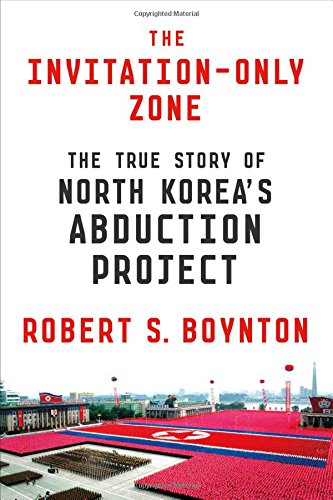
The Invitation-Only Zone
The True Story of North Korea's Abduction Project
کتاب های مرتبط
- اطلاعات
- نقد و بررسی
- دیدگاه کاربران
نقد و بررسی

November 23, 2015
The wackiness of North Korea’s government is a staple of TV comedy, but the reality is more grim, as journalist Boynton (The New New Journalism) relays in this disturbing account of the current regime’s kidnappings. In 1977, North Korean agents began abducting young Japanese citizens for reasons that remain unclear; they probably hoped to convert the victims to loyal Communist subjects who would return to Japan as spies. By the early 1980s, the project fizzled out, but the abductees remained in North Korea. In 2002, after years of protest, North Korean officials admitted that a few Japanese were in their country against their will. They returned five abductees. Observers, Boynton included, agree that many remain. In his narrative, Boynton alternates among heartrending stories of the abductees, a history of Japan that emphasizes its disgraceful treatment of Korea, and records of the Japanese government’s incompetence in handling the issue once it became known. In light of the bizarre and tragic nature of North Korea’s Juche system (its state ideology), this particular series of events may seem inconsequential, but Boynton has done his homework well, converting the suffering inflicted on a few dozen individuals into an eye-opening and surprisingly moving narrative. Maps & illus.

September 15, 2015
A thorough investigative report into the systematic abduction of Japanese citizens by the North Korean intelligence network over many decades. Journalist Boynton (Director, Literary Reportage Program/New York Univ.; The New New Journalism: Conversations with America's Best Nonfiction Writers on Their Craft, 2005) continually circles back to the essential question regarding these absurd scenarios of abduction from the streets and coasts of Japan since the mid-1970s: what was the point of kidnapping the Japanese and bringing them back to North Korea for brainwashing? The author explores the racial aspect: was the program an attempt by Kim Jong-Il's authoritarian regime to instigate a "long-term breeding program" through abducted Japanese couples to introduce a mixed race that might serve as perfect spies? Or was the purpose to steal identities with which to create fake passports? Or possibly to get back at Japan for its long history of imperial ravaging? Boynton takes a few of these sagas of abduction and brings them vividly to life-e.g., the fairly typical story of Kaoru Hasuike and his girlfriend, Yukiko Okudo, who were young students in 1978 when they were abducted from a Japanese beach and transported to North Korea. Separated for "re-education" for two years and then reunited and married, the couple was moved through so-called heavily guarded "invitation-only zones" in Pyongyang, a kind of "gilded cage" for exceptional cases. For the couple, it was a way to keep them isolated and away from prying eyes. Thanks to a wrenching act of diplomacy between the two countries in 2002, Kim Jong-Il publicly apologized for the abductions, and an "extended visit" was arranged for a handful of surviving abductees (their children back in North Korea served as "de facto hostages") to return to Japan, including the Hasuikes. The author seems as mesmerized by all this strangeness as readers will be. More than anecdotal stories, his work zeroes in on the deeply uneasy makeup of the Korean-Japanese relationship. Engaging reading, surreal in some of the Orwellian detail.
COPYRIGHT(2015) Kirkus Reviews, ALL RIGHTS RESERVED.

Starred review from November 1, 2015
In the 1970s and 1980s, the North Korean government kidnapped people from Japan, South Korea, and elsewhere. Boynton (journalism, New York Univ.; The New New Journalism) investigates this phenomenon by examining the stories of Japanese abductees. When the first people went missing, mainstream Japanese society had difficulty believing that North Korea was behind it. In 2002, Kim Jong-Il admitted that 13 people had been kidnapped, and that eight of them were dead, revelations that outraged the Japanese public. It's widely believed that many more were taken. The book's narrative switches back and forth between the life stories of individual abductees and the history of Japanese-Korean relations since the 19th century, helping to place the abductions in a larger context. Boynton explores various theories about the reason for these kidnappings: to teach foreign languages to North Korean agents, to raise a generation of spies from their offspring, etc. Ultimately, no clear motive is understood, and many questions are left unanswered. VERDICT An excellent work that is an optimal choice for both North Korea and Japan watchers. For another story regarding North Korea's history of kidnapping, see Paul Fischer's A Kim Jong-Il Production.--Joshua Wallace, Ranger Coll., TX
Copyright 2015 Library Journal, LLC Used with permission.

























دیدگاه کاربران